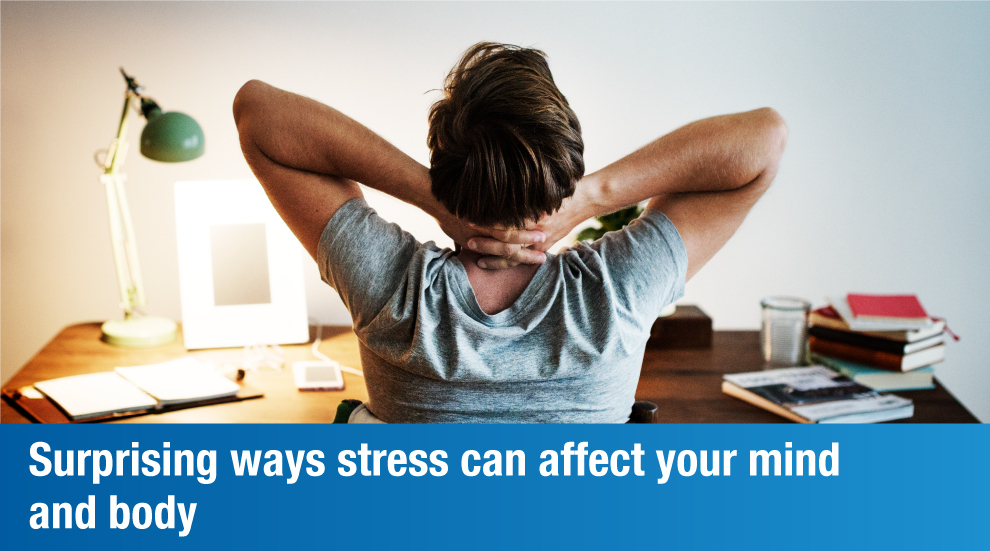
Stress — all of us have experienced it in some form or the other. However, if left unmanaged, stress may have a negative impact on our body and mind. Let\’s start by understanding more about the phenomenon.
What is stress? It is our body\’s way of responding to a demand or threat. At normal levels, stress helps one stay focused and alert — to tackle challenges at home and work. However, when faced with a threat, it prepares us for a \’fight or flight\’ response. But beyond a certain threshold, stress can affect physical and cognitive health.
Symptoms The most alarming thing about stress is that people get used to it and accept it as \’normal\’, often not noticing the toll it takes on their bodies and minds. Therefore, it is imperative to know how to spot the typical symptoms. They have been divided into three categories depending on what is affected.
Cognitive symptoms include:
- Memory issues
- Lack of concentration
- Poor judgment
- Negativity
- Anxiety
- Persistent feeling of worry
Physical symptoms include:
- Aches and pains
- Diarrhea or constipation
- Nausea or dizziness
- Rapid heart rate
- Sexual issues
- Frequent colds
Emotional symptoms include:
- Depression
- Anxiety
- Frequent mood swings
- Anger
- Feeling overwhelmed
- Isolation
Behavioral symptoms include:
- Inconsistent eating patterns
- Change in sleeping pattern
- Withdrawal
- Substance use
Types The American National Institute of Mental Health (NIMH) has identified two major forms of stress.
Acute stress This is short term and often has a clear and immediate solution. A person may go through acute stress after an argument with a friend or a family member, or when trying to meet an urgent deadline at work. However, this type of stress disappears once the issue is resolved. If faced regularly though, it can be harmful in the long run.
Chronic stress This type of stress manifests over a long period and adversely affects the person’s body as well as their mental health. Long-term financial and personal issues or a sudden traumatic experience like the death of a loved one can lead to chronic stress. If untreated, it can cause disorders of the cardiovascular, respiratory, immune, and reproductive systems.
Chronic stress can also become a part of the person\’s personality making them immune to the mental and physical risks involved. Moreover, a breakdown during such a phase can make one indulge in violent acts, suffer a heart attack, or even attempt suicide.
Causes People have different stressors. While certain situations can trigger a response in one person, the same issue might not arouse any reaction in another. Having said that, these are some common and major life events that can prove stressful to all. They include:
- Financial troubles — unemployment, retirement, lack of savings
- Chronic illness or injury
- Death of a loved one
- Family issues
- Troubled relationships, marriage, and divorce
Neuropsychiatric disorders such as epilepsy, Alzheimer’s disease, autism, schizophrenia, and migraines — caused due to a dysfunction in the central nervous system — are also a cause for stress.
Treatment Diagnosing stress is a challenge in itself. The doctor will inquire about the individual\’s symptoms and the events that might have led them to a stressful situation. For the professional to uncover those reasons, a face-to-face interview is the most effective way. Once diagnosed, the person will be prescribed medication or asked to undergo stress management.
Medication Usually, doctors don\’t prescribe medicines unless they are treating an underlying condition like depression. Most antidepressants have various side-effects and there is a chance that they might only mask the stress, not cure it. It should be noted that self-medication should be avoided in all circumstances.
Stress management Various lifestyle changes can help one manage stress. They include:
Acknowledging the signs The first step towards rehabilitation is accepting the fact that one is going through stress. Being in denial is only going to aggravate stress.
Exercising Apart from physical benefits, regular exercise distracts from the cycle of negativity. A good workout helps shift the focus from a stressful thought to the physical activity.
Maintaining a balanced diet A healthy diet that includes fruits and vegetables strengthens the immune system and helps fight stress better. A poor diet will weaken the system and make the person prone to diseases and add to the stress.
Managing time
Jotting down a to-do list helps one prioritize daily tasks, and efficiently finish the jobs that may act as stressors.
Relaxing A step back from the daily routine will help one self-introspect. Often, the individual will know exactly what kind of situations to avoid to stay away from stress.
At Plexus, an award-winning Neuro and Cell Research Centre, stress-related issues — including the treatment of neuropsychiatric disorders (a major cause of stress), are dealt with using various rehabilitative methods. Specially trained therapists help patients overcome stress while dealing with their underlying problems. Remember, if severe disorders and conditions can be managed through rehabilitation, then so can stress!










